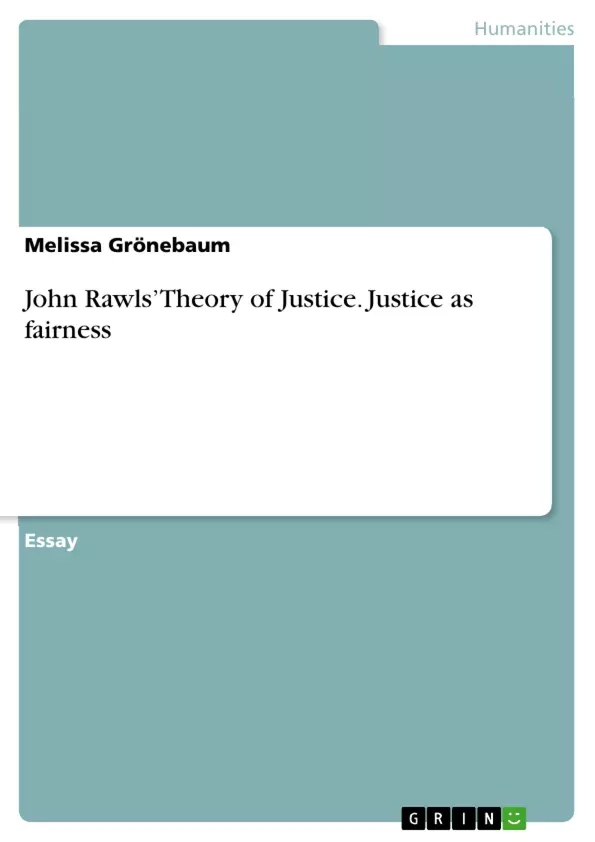The Theory of Justice is one of the most important works concerning moral and political philosophy of the 20th century. In his work, John Rawls presents a widely persuasive Theory of Justice and elaborates his idea of ‘justice as fairness’. Outgoing from the original position, thus defining a veil of ignorance, Rawls assumes that people would choose fundamental principles which are only for the benefit of everyone and offer no advantages for any special social groups. Rawls expects people in the original position to choose two specific principles of justice on which to found their political association. In this essay I will present these principles and Rawls’ justification for their choice. Furthermore, I will assess his success and will argue for ‘justice as fairness’ being one of the fairest theories on the one hand, but unfortunately on the other hand likewise hard to realize.
Table of Contents
- John Rawls' Theory of Justice – Justice as fairness
- The original position and the veil of ignorance
- Two principles of justice
- Arguments in favor of justice as fairness
- Problems of the theory of justice as fairness
Objectives and Key Themes
John Rawls' "Theory of Justice" is a seminal work in moral and political philosophy that attempts to establish a framework for a just and equitable society. The text explores Rawls' concept of "justice as fairness," which seeks to define principles of justice that would be chosen by rational individuals in a hypothetical original position where they are ignorant of their own social standing, talents, and circumstances.
- The original position and the veil of ignorance
- Two fundamental principles of justice: equal liberty and democratic equality
- The concept of justice as fairness and its advantages
- Criticisms and challenges to the realization of justice as fairness
- Comparison with other political philosophies, particularly utilitarianism
Chapter Summaries
The text begins by introducing Rawls' "Theory of Justice" and its central concept of "justice as fairness." Rawls posits a hypothetical "original position" where individuals are behind a "veil of ignorance," lacking knowledge of their social status, talents, and personal circumstances. This veil of ignorance ensures that individuals will choose principles of justice based on rational considerations rather than self-interest.
Rawls argues that individuals in the original position would choose two principles of justice: the equal liberty principle, which guarantees basic liberties for all, and the principle of democratic equality, which allows for social and economic inequalities only if they benefit everyone, particularly the least advantaged. The text explores the reasoning behind these principles, highlighting the maximin rule as a key factor in the decision-making process.
The text further examines the advantages of justice as fairness, emphasizing its focus on the well-being of the worst-off groups in society while also upholding the principle of equal liberty. The text also considers potential problems and criticisms of justice as fairness, including its abstract nature and the difficulty of implementing such a theory in practice. A comparison with utilitarianism is offered, highlighting the key differences between these two philosophical approaches to justice.
Keywords
The text revolves around the key concepts of justice, fairness, and equality. Central to Rawls' argument is the concept of the "original position," a hypothetical scenario that serves as a framework for deriving principles of justice. Other important keywords include the "veil of ignorance," "maximin rule," "equal liberty," "democratic equality," and "utilitarianism." The text also explores the challenges of realizing justice as fairness in the real world, addressing issues such as inequality, social and economic disparity, and the role of the state.
Frequently Asked Questions
What is John Rawls' main concept in "A Theory of Justice"?
His central concept is "justice as fairness," which focuses on establishing principles of justice that rational people would agree upon in an equal starting position.
What is the "veil of ignorance"?
It is a hypothetical state where individuals making decisions about society do not know their own social status, class, talents, or intelligence, ensuring impartiality.
What are the two fundamental principles of justice according to Rawls?
The first is the "equal liberty principle" (basic rights for all), and the second is "democratic equality" (inequalities are only allowed if they benefit the least advantaged).
What is the "maximin rule"?
The maximin rule is a decision-making strategy where one chooses the option that has the best possible outcome for the worst-off members of society.
How does Rawls' theory compare to utilitarianism?
Unlike utilitarianism, which seeks the greatest good for the greatest number, Rawls' theory protects individual rights and focuses on the well-being of the least advantaged.
- Quote paper
- Melissa Grönebaum (Author), 2013, John Rawls’ Theory of Justice. Justice as fairness, Munich, GRIN Verlag, https://www.grin.com/document/268383



